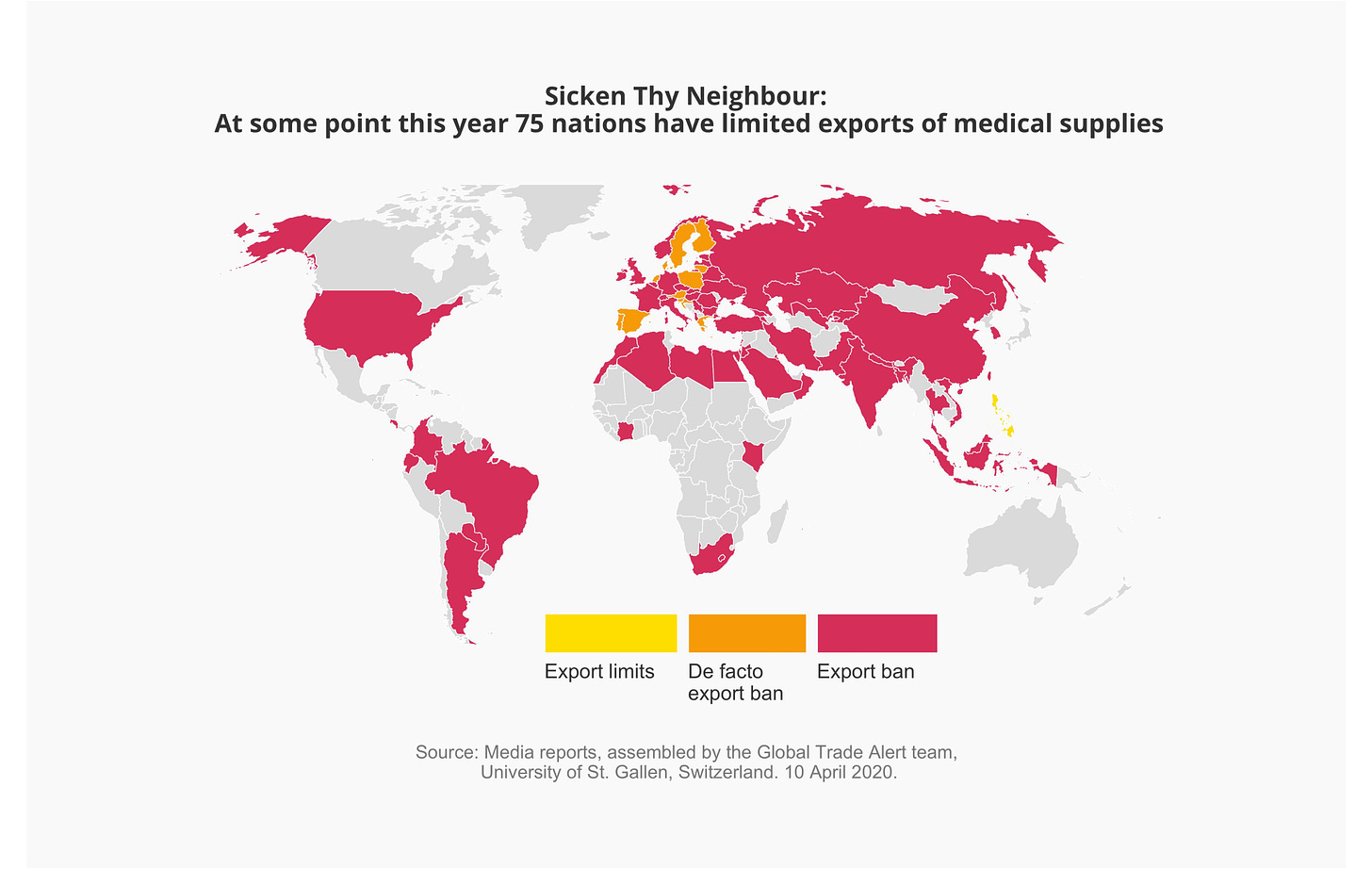Is Pharma the New Tech?
An increasing set of industries is facing political borders, Pharma is the next one.
Good Morning!
Welcome to a new issue of Political Disruption! I hope you’re all healthy at home. This week I talk about how the Coronacrisis demonstrates how the range of sectors that face politically constrained supply chains and markets expands. After finance and tech, pharma is the new sector for whom globalization gets constrained.
Enjoy this latest issue of Political Disruption!
Hans (@hans_diels )
P.S. Please share this issue with all your friends, colleagues, kids, grandparents who need some extra reading while in lockdown.
Thanks!
Hans

Arms dealers have long known the limitations that world politics place on them. They can not sell innovative weapon systems to geopolitical competitors. And sectors that want to sell products that have a dual (civil and military) use have also known these restrictions for some time. However, the set of industries considered strategically important is increasing. Consequently, fewer companies can sell their products all over the world without political constraints.
9/11
After September 11, the war on terror was fought not only on the battlefields of Iraq and Afghanistan but also in the arcane world of the global financial sector. Initially, financial communication companies such as SWIFT, based in Belgium, were used. SWIFT is responsible for financial communication between banks. The company was obliged to release data to detect terrorist financing flows. After that, the banks themselves were put under pressure to stop all activities linked to the financial streams to terrorist organizations and (later also) 'rogue states' such as Libya and Iran. Companies that did not strictly adhere to these (American) rules paid a heavy price for this. The Belgian-French bank BNP Paribas was fined nearly $ 9 billion for violating various sanctions regimes.
Huawei
More recently, we saw how technology companies increasingly became both a target and a weapon in the geopolitical competition between countries. Technology companies working on 5G, artificial intelligence, and quantum computing are increasingly seen as a strategic asset. 1) States do no longer just want to share their technology with other countries. US companies were forbidden to export face recognition technology to China because China used the technology in the suppression of the Uighur minority in Xinjiang. 2) States exert controls on incoming technology from other countries. The Americans no longer allow products from Chinese technology companies such as Huawei and ZTE in their 5G systems and are urging other countries to stop doing this. The fear that this technology would be used to spy or carry out cyberattacks is too high. And Americans know the dangers of this better than anyone as they have used the technological dominance of American software companies for years to infiltrate the information systems of other countries.
Corona
During the Corona crisis, a new sector was discovered as critical to national security: the pharmaceutical and medical industry. When production in China was shut down, it became clear that a large part of the active ingredients for medicines was produced in China and that the rest of the world became very vulnerable to interruptions there. In the meantime, it became clear that even in the supply chains of health care, countries are not afraid to close their borders to other countries. Germany, Russia, and Turkey introduced export controls on medical materials, sparking outrage in the U.S. At the same time, U.S. President Trump attempted to purchase $ 1 billion from the German company Curevac in to secure a possible COVID19 vaccine for exclusive use in the U.S.
A map made by Prof. Simon Evenett shows how states are increasingly restricting medical exports.

Is the food industry next?
Many sectors that, until recently, had global production chains increasingly face political barriers. The next industry falling prey to geopolitical interference may be the food sector. When a global crisis puts food production under pressure, countries will also make choices in this regard. For example, the Russian government last month considered limiting grain exports.
Towards a less global economy
Does this mean that the global economy will 'de-globalize'? No, supply chains will continue to spread globally, but political boundaries will curtail a widening range of sectors in their choice of the countries in which they produce and sell their products. And that will reduce the efficiency gains of multinational companies. But for smaller companies, the tendency to build some things a little more locally can also offer new opportunities.


